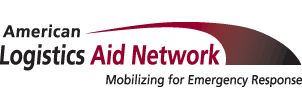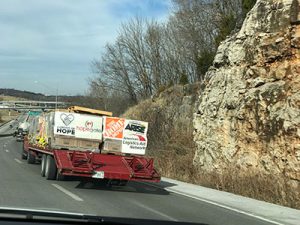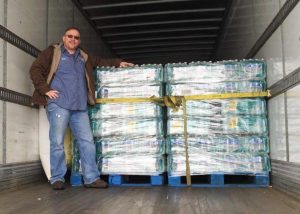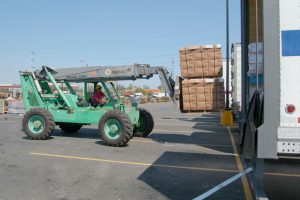Frequently Asked Questions
What does ALAN do?
ALAN evolved to help deliver aid to communities affected by crisis without a lot of the usual roadblocks. We exist to provide disaster relief organizations (and other non-profits) with supply chain assistance when and where it’s needed most.
Is ALAN a "competitor" to disaster relief organizations?
No. ALAN is here to be a resource for and help to these organizations – and to work alongside them as needed when disasters strike. For example, we are a proud partner member of the Voluntary Organizations Active In Disaster (VOAD) at both the state and national levels, where we were named the partners of the year in 2018 and 2010; in fact, VOAD named its partner of the year award after our founding president, the late Jock Menzies. (For more about VOAD and the many other organizations we work with, see our list of partners.)
Don't most disaster relief organizations already have logistics organizations?
Some do. Some don’t. But at some point, almost all of them struggle with some area of their logistics – including trying to stretch every warehousing and transportation dollar they have in order to achieve the maximum impact.
What's so difficult about disaster-related logistics?
Getting items delivered during blue skies is challenging enough. Now consider having to build a supply chain on the fly, in a place where you’ve rarely (or perhaps never) done “business,” all while trying to navigate a system of ports, airports, roadways or railways that might be severely damaged or temporarily blocked.
That is the challenge that many disaster relief organizations face when crises hit. It’s also what makes an organization like ALAN so critical.
Unlike businesses, these organizations usually don’t have the benefit of historical data or months of network optimization to work with. Nor do they have the luxury of a lot of time to figure things out, because communities in crisis typically need things such as food, water and medicine delivered yesterday.
We are here to help bridge those gaps on a wide variety of fronts.
What kind of assistance does ALAN provide?
ALAN is available to help connect relief organizations with the supply chain equipment, services, expertise and support they need most. As a result, we predominantly provide help in four areas:
- Ground transportation
- Warehousing services and space
- Material handling equipment, including pallets, forklifts, pallet jacks and boxes
- Information/intelligence
Tell us more about the information management part of ALAN’s work.
After disasters strike, there are usually many transportation variables that need to be addressed. These include:
- Assessing the latest road conditions (and closures of the same)
- Figuring out which area providers and services are operating
- Knowing whether or when logistics services to that area are going to be available
- And sorting out who the key disaster relief players (key non-profits and government agencies) are in order to avoid duplication of effort
ALAN is available to help organizations find the right answers ASAP. In some cases, we already have this data at our fingertips thanks to our many participating partners, IT systems, and the many years we’ve spent focusing on supply chain disaster relief. In others, we can usually immediately put these organizations in touch with someone who does.
Does ALAN purchase logistics services?
ALAN typically does not purchase logistics services for our response activities. We are reliant on donations of these services from generous companies and individuals from throughout the supply chain community. In fact, we would gladly welcome a donation from you, either in the form of expertise, resources or funds – or all three!
How can a non-profit organization request ALAN’s help? And how long will it take ALAN to respond after a request is made?
Non-profit organizations can request ALAN’s help by visiting the “Request Support” section of our website and filling out the appropriate form.
Please know that ALAN tries to acknowledge all requests within 8 hours and to respond with some type of solution within 48 hours. However during disasters, that response time may be slower simply because of the sheer volume of requests and work that we’re handling. So bear with us if you don’t hear back from us immediately. We WILL get back to you, and your request IS important to us.
What kinds of products is ALAN asked to help move most often?
Transporting hydration, usually in the form of bottled water, has been the number one need. Other common requests include food, medical equipment and supplies, generators/power supplies, pet care items, and hygiene and cleaning supplies.
What piece of material equipment is ALAN asked to find a donation of most often?
Many relief organizations are sorely in need of pallet jacks and pallets themselves. Both are easy for non-profits to use and apply to a challenge without requiring formal industrial equipment training.
What logistics service is ALAN asked to help find a donation of most often?
Long-haul transportation is by far our number one request. Sadly, it’s also the hardest to fill. (And yes, members of the trucking community, that is a hint. ALAN would be over the moon to have more of your participation.)
How can a member of the logistics community get involved?
There are many ways to be part of ALAN’s efforts, including:
- Providing in-kind donations of logistics services, equipment or facilities
- Volunteering time and expertise
- Providing financial support by becoming a sponsor, member or one-time donor
- And serving as one of our information ambassadors by liking our Facebook posts, re-tweeting items on our Twitter feed or including information about our company on LinkedIn or your company’s blog.
What is the most unusual request for assistance that ALAN has received?
To (partially) quote the Wizard of Oz, “lions and tigers.” During the Oregon wildfires of 2017, a large animal rescue group asked us to help find a source to evacuate the wild animals if the need arose. We’re happy to say we were able to line those transportation services up – and even happier to say those services didn’t wind up being necessary.
Does ALAN assist with disasters outside the United States?
Absolutely, although our efforts typically don’t involve end-to-end logistics assistance like they do in the United States. We’re available to help with the first-mile (domestic U.S. portion) of international disaster relief and look to our other philanthropic partners to handle the freight forwarding and last-mile portion of these efforts.
Over the years we have been involved in disasters ranging from the 2017 wildfires in Santiago and 2010 earthquake in Haiti to the 2013-2014 Ebola outbreak, for which our work, along with that of our partners Airlink and LIFT, was recognized by the Clinton Foundation.
What does ALAN do during the “off” season?
There’s never really an “off” season because each disaster we help with has a variety of phases (preparation, response, recovery, and mitigation), including several that occur well after all the dust has settled.
That said, during the rare times when we are less busy, we spend a lot of time building the chain of support that’s so essential to what we do – including becoming more engaged with government organizations like FEMA, attending or presenting at conferences and participating in a wide variety of disaster-related workshops.
Is there anything about disasters that ALAN really wishes more businesses and individuals knew?
First of all, find out who your community’s emergency management professionals are – and build a relationship with them, especially if your company is a key supplier of food, water and other materials that people generally need. After all, if these officials don’t know that your area distribution center plays a critical role in keeping grocery store shelves, hospitals or other similar places stocked, they may not prioritize restoring the road service, electricity or other key services to your DC when the time comes.
Second, be as connected and engaged locally as you can – and not just to your own industry or business circle. The communities that recover the fastest after a disaster are always those that have strong social and philanthropic ties.
Third, think twice before starting a collection drive, because individual, unsolicited donations of products often provide extra logistics challenges to supply chains that are already over-challenged and disrupted. Most donated items require a great deal of time to sort and repack – and that’s time most disaster relief and first response organizations usually don’t have to spare in the initial days and weeks after an incident. These items also consume what is already a highly limited amount of logistics capacity (like space on trucks or shipping containers). In addition, the organizations or destinations they’re traveling to often are not prepared to receive or distribute them. Our advice for those wishing to assist is to make a financial contribution to a reputable/vetted non-profit organization such as one that is a member of the National Voluntary Organizations Active in Disaster (NVOAD) instead.
My business has been affected by a disaster. Can ALAN help me, too?
Although ALAN’s priority is helping the organizations which serve communities and individuals, ALAN also provides a number of services to assist businesses affected by disaster.
These include:
- Hosting calls with the business community before, during and after disasters to share situational awareness and discuss specific logistics challenges and solutions (often with the help of the relationships we have with government emergency management groups)
- Providing vetted and validated information about conditions in disaster areas
- Connecting businesses to resources and organizations that can support recovery for their employees and their business
- And helping businesses support their employees in the affected region by finding logistics providers that can ship relief supplies to those employees.
Can ALAN connect me to FEMA for business opportunities?
If you’re a carrier who wants ALAN to connect you with FEMA for work or new business opportunities, we’re sorry to say that you’re not in the right place. While we at ALAN would like to be of help, we’re solely a non-profit who serves other non-profits, and we’re not able to assist with any other requests at this time. Our best advice is to recommend that you contact FEMA directly using the links below as a starting point. We hope you’ll find them helpful, and we wish you every success.
https://www.fema.gov/industry-liaison-program (Once there, scroll down to the “How to do Business With FEMA” section.)
https://www.fema.gov/transportation-programs (Once there, scroll down to the “Becoming A FEMA-Approved Transportation Provider” section.)




